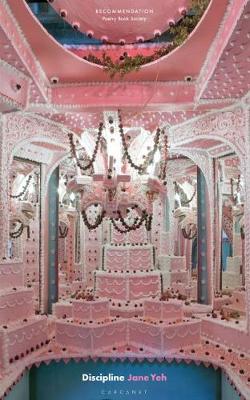Discipline

As seen:
By Jane Yeh
avg rating
1 review
Buy this book from hive.co.uk to support The Reading Agency and local bookshops at no additional cost to you.
A Poetry Book Society Spring 2019 Recommendation. In Discipline, her third collection, Jane Yeh depicts a haunting and hilarious variety of lives, from an endangered young rhinoceros to the denizens of the 1980s New York club scene.
These multifaceted poems explore what identity isn’t and is, as performance, as struggle, as change, as art, with penetrating wit, channeling the voices of outsiders, artists, misfits, and others.
Discipline inhabits the space between the real and the surreal, a mash-up of deadpan humour and heartbreaking imagery where novelty T-shirts and lady astronaut centaurs can coexist.
The poems are triggered by videos, paintings and installations by contemporary artists, animals and city life.
They bristle with striking details and observations.
Imaginary landscapes converge with episodes from recent history: power, resistance and the structures of oppression are seen inexorably in operation.
These miniature dramas perform their own autopsies: `Sweet, then sour.
My lips the colour of Doubt’.
TweetReviews
Discipline by Jane Yeh
1) reviewed by Kathy Livingstone
⭐️⭐️ I thought that A Short History of Style was a strange and bemusing choice of poem to open this collection of poems. I hadn’t appreciated that there were some notes at the back of the book, and searched the internet to inform myself about something that was clearly referenced. Whilst I’m all in favour of lifelong learning, this isn’t really how I’d like to approach a book of poetry. Not off to a great start. (The research was helpful and enlightening but I’m already thinking “perhaps too niche for me”.
The second poem, A Short History of Migration, was more immediately accessible to me: about trying to fit in at whatever cost. In fact, I found it a very clever poem full of machine-gun-fired statements of simple factual actions piled one on the other until those last two acerbic lines.
So many of the poems however lost me from the first two lines - and yet I rather loved a few, viz,
• A Short History of Patience - especially the image
“Ryegrass spreading through the yard like an open secret
The blue line of the horizon like an eyelid, closed.
• Happy Hour, New York City
A masterpiece in creating atmosphere which transported this reader there, body, mind and soul.
• Pacific Pocket Mouse
How could one fail to be moved by this plea from the mouth of such a rare tiny creature? (Perhaps it’s the Scots in me and Rabbie Burns’
“Wee, sleekit, cow'rin, tim'rous beastie,
O, what a panic's in thy breastie!”). Once again the notes really were a necessary aid to engaging fully with this poem.
• Rejected Book Reviews
I’m still laughing - delightfully bonkers!
Niche audience? I’d say so, but perhaps it’s more a case of something here for everyone. You won’t know unless you try.
2) Reviewed by Jill Hasler
⭐️⭐️
This is a slim anthology which has 35 different poems in three sections. I wasn’t sure about the way it is divided up and hoped it would be revealed when I’d read them all. (It wasn’t!)
The first one, A Short History of Style, started me off positively. The notes at the back were welcome and helped me understand the content. I know the painting the first part describes from the cover of The House of Mirth by Edith Wharton and appreciated the way some of the description captured it and the heroine of the novel. I didn’t understand how the rest of the poem related to this or the title. In some ways this was a false start as I found many of the poems that followed didn’t resonate with me. Those that told a story were more approachable and there were some memorable and expressive lines. One of these was from A Short History of Migration:
“We attended bake sales with a suspicious degree of fervour.
We hindered our children with violins, bad haircuts and diplomas. “
Overall, I found that when I couldn’t follow what the poem was about, or they were written in a way that I think of as prose I didn’t enjoy them. This is obviously very subjective and not the only reason for my relatively low rating. I felt alienated by the experience and think that if so much explanation is needed how many readers will understand and appreciate them?






